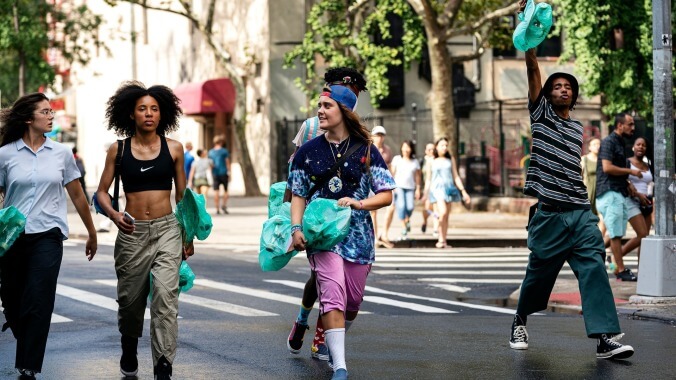Thankfully, Moselle has managed to harness the charm of her festival darling for her serialized HBO adaptation Betty, broadening the focus of its source material—which previously zeroed in on the growing pains of 18-year-old Camille (Rachelle Vinberg)—and delving deeper into the lives of the rest of the squad. With each character allowed the space for their own personal journeys, Betty nicely expands the Skate Kitchen universe with a dramedy that is an authentic and endearing look at sisterhood and the trials of burgeoning adulthood.
While the series heavily derives from the source material, new viewers are given the benefit of a gentle reset. The players remain almost exactly the same, sans a couple of changed names; however, in this iteration, none of the events from the film have taken place, offering a fresh set of circumstances that brings this group together. A lot of familiar beats happen again here: Camille still struggles with balancing her new friendships and desire for romance; Kirt (Nina Moran) remains a hot-headed loyalist; Janay (Ardelia “Dede” Lovelace) continues to act as the glue that binds the young women together; and there is virtually no difference between Kabrina Adams’ Ruby and her Betty-fied persona, Honey Bear, both sweetly awkward documentarians with a bold sense of politically fueled style. Indigo (Ajani Russell) is even relatively the same, though Betty slightly transforms her into a well-to-do weed-pen peddler and skateboarding novice. If they accomplish little else, the minor, fairly inconsequential adjustments cement Moselle’s desire to keep the two entities somewhat separate.
And yet, having some understanding of Skate Kitchen’s understated, slice-of-life tone proves to be of some benefit going into Betty. Without that context, the beginning of the series can feel a bit sluggish, until episode three, “Happy Birthday, Tyler,” when one of the more prominent arcs—a #MeToo incident that causes Janay to grapple with the potentially predatory behavior of a friend—begins to build. The moments that aren’t laser-focused on one of the few running storylines are couched in loving, expertly crafted shots of Manhattan in action—from dance parties in the park to languid peeks at the city’s youth—which fuel the documentary-style tone. Betty doesn’t aim to further glamorize the city or these girls, because both are engaging enough as they are.
Which is why it’s a relief to see that these budding actors were not saddled by an overwrought script with heightened dialogue. Everyone offers lived-in performances that speak to their overall potential even beyond this particular niche, especially in the cases of Lovelace and Moran, who flex in drama and comedy, respectively. Yes, this ensemble is at a serious advantage thanks to the chemistry they’ve cultivated for years offscreen, but their ability to translate their dynamic for scripted television is promising. If the more contrived bits (like a convoluted Indigo-centered subplot that addresses cultural appropriation) present a challenge, this cast doesn’t show it, handling the moments that are potentially less biographical with aplomb.
Above all else, the show is a spunky, infectious tale of community and agency. Moselle and company continue to find an undercurrent of youthful innocence amid the inherent rebellion of their freewheeling lifestyle (casual drug use and all) that makes these figures just as true and well-rounded as their real-life counterparts. Brazen and delightfully gruesome at times, Betty transcends the subculture it centers to provide a story of strength for all girls.



 Keep scrolling for more great stories from A.V. Club.
Keep scrolling for more great stories from A.V. Club.